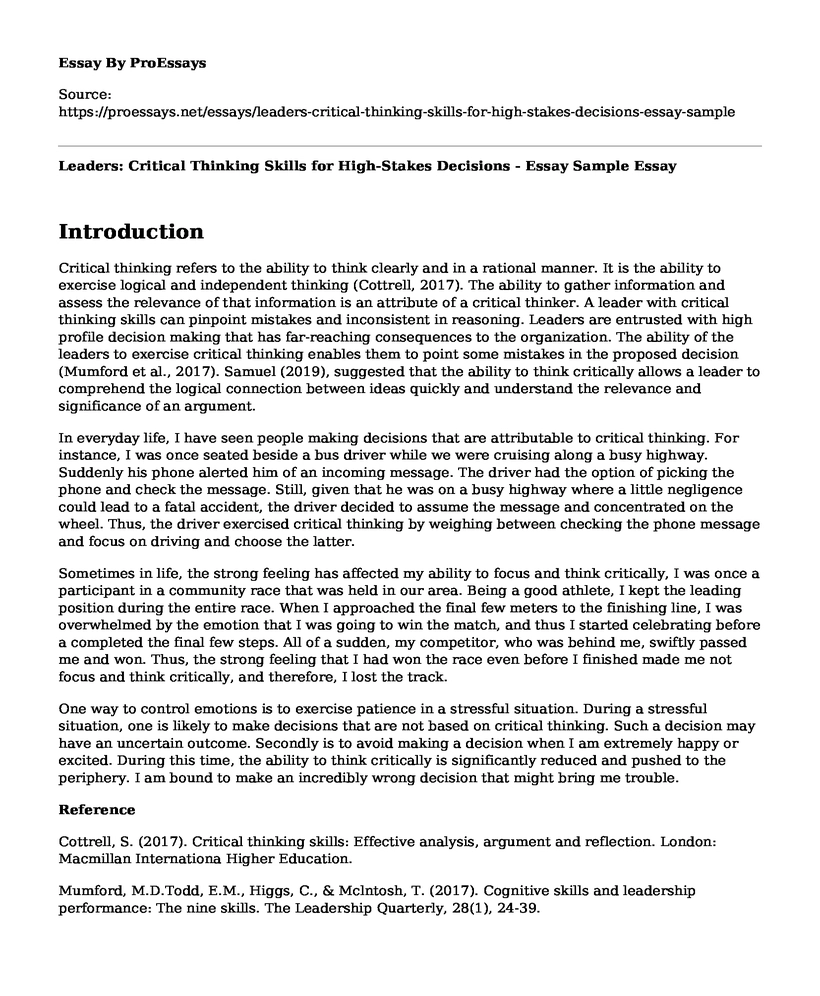Introduction
Critical thinking refers to the ability to think clearly and in a rational manner. It is the ability to exercise logical and independent thinking (Cottrell, 2017). The ability to gather information and assess the relevance of that information is an attribute of a critical thinker. A leader with critical thinking skills can pinpoint mistakes and inconsistent in reasoning. Leaders are entrusted with high profile decision making that has far-reaching consequences to the organization. The ability of the leaders to exercise critical thinking enables them to point some mistakes in the proposed decision (Mumford et al., 2017). Samuel (2019), suggested that the ability to think critically allows a leader to comprehend the logical connection between ideas quickly and understand the relevance and significance of an argument.
In everyday life, I have seen people making decisions that are attributable to critical thinking. For instance, I was once seated beside a bus driver while we were cruising along a busy highway. Suddenly his phone alerted him of an incoming message. The driver had the option of picking the phone and check the message. Still, given that he was on a busy highway where a little negligence could lead to a fatal accident, the driver decided to assume the message and concentrated on the wheel. Thus, the driver exercised critical thinking by weighing between checking the phone message and focus on driving and choose the latter.
Sometimes in life, the strong feeling has affected my ability to focus and think critically, I was once a participant in a community race that was held in our area. Being a good athlete, I kept the leading position during the entire race. When I approached the final few meters to the finishing line, I was overwhelmed by the emotion that I was going to win the match, and thus I started celebrating before a completed the final few steps. All of a sudden, my competitor, who was behind me, swiftly passed me and won. Thus, the strong feeling that I had won the race even before I finished made me not focus and think critically, and therefore, I lost the track.
One way to control emotions is to exercise patience in a stressful situation. During a stressful situation, one is likely to make decisions that are not based on critical thinking. Such a decision may have an uncertain outcome. Secondly is to avoid making a decision when I am extremely happy or excited. During this time, the ability to think critically is significantly reduced and pushed to the periphery. I am bound to make an incredibly wrong decision that might bring me trouble.
Reference
Cottrell, S. (2017). Critical thinking skills: Effective analysis, argument and reflection. London: Macmillan Internationa Higher Education.
Mumford, M.D.Todd, E.M., Higgs, C., & Mclntosh, T. (2017). Cognitive skills and leadership performance: The nine skills. The Leadership Quarterly, 28(1), 24-39.
Samuel, D. (2019). Critical Thinking in Science and Technology: Importance , Rationale, and Strategies. In Handbook of Research on Critical Thinking and Teacher Education Pedagogy, 177-193.
Cite this page
Leaders: Critical Thinking Skills for High-Stakes Decisions - Essay Sample. (2023, Aug 13). Retrieved from https://proessays.net/essays/leaders-critical-thinking-skills-for-high-stakes-decisions-essay-sample
If you are the original author of this essay and no longer wish to have it published on the ProEssays website, please click below to request its removal:
- Leadership Concepts and Practice Essay
- Consequences of Not Implementing the Change in Acme Inc Essay
- Leadership Profile - Paper Example
- Essay on Delegating Duties for Sick Leave: 6 Steps for Growing Companies
- Research Paper on Organizational Strategic Planning: Change for Thriving & Outperforming Competitors
- Essay Example on MENA Region: Fostering Economic Growth & Enhancing Mutual Benefits
- Essay Sample on HRM: Enhancing Cohesion, Discipline, and Problem-Solving in Organizations







